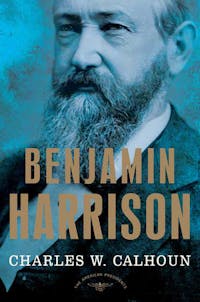Benjamin Harrison
The American Presidents Series: The 23rd President, 1889-1893
 Download image
Download image
ISBN10: 0805069526
ISBN13: 9780805069525
Hardcover
224 Pages
$31.00
CA$43.50
Politics was in Benjamin Harrison's blood. His great-grandfather was a signer of the Declaration of Independence; his grandfather William Henry Harrison was the ninth President of the United States. Harrison, a leading Indiana lawyer and a strict antislavery Presbyterian, quickly became a champion of the young Republican Party, even taking a leave from his Civil War service to campaign for Abraham Lincoln.
Harrison was a master on the stump, and his speeches advocating the Republicans' ideals of free labor and upward mobility became crowd favorites. After rising through the state party and claiming a U.S. Senate seat, Harrison, who hailed from one of the two important swing states of the day, was chosen by the Republicans as their presidential candidate in 1888. Despite losing the popular vote, he prevailed over the incumbent, Grover Cleveland, in the electoral college.
With the House and Senate under Republican control, Harrison exemplified the activist president. He worked feverishly to put the party's planks into law, including tariff reform and the landmark Sherman Anti-Trust Act, and approved the first billion-dollar peacetime budget. But with Democrats winning control of Congress in 1890, and Harrison's attempts to please Republican Party bosses with government appointments falling short, the president was left with few enthusiastic supporters during his quiet race for reelection. (The First Lady was ill, and died two weeks before election day.) In the end Harrison's record could not beat Cleveland—and the sectional politics of a still-healing nation—in their unprecedented rematch.
With dazzling attention to the president's life and the social tapestry of his times, Charles W. Calhoun compellingly sweeps away the stereotypes of the Gilded Age and reconsiders Harrison's legacy in the making of the modern presidency.
Reviews
Praise for Benjamin Harrison
"One of the most revelatory entries in the American Presidents series."—Ray Olson, Booklist
"The closer one looks at Benjamin Harrison, the less he seems to fit the stereotype of Gilead Age governance. In an age when many in public life enshrined selfishness and espoused laissez-faire, Harrison believed that government had a responsibility to act for the public good. A devout Presbyterian, he held a deep conviction that both men and nations are judged by their deeds. The national government, he believed, had an obligation to pursue policies to promote economic growth and equity. In an era when most chief executives deferred to Capitol Hill, Harrison was a engaged legislative president, working closely with Congress to fashion and enact a host of landmark laws. Similarly, he gave close personal attention to foreign affairs. He expanded trade, revitalized the navy, guided the country through a series of crises, and won, new respect for America from foreign powers, great and small. The voters denied him reelection, but Harrison nonetheless left to his successors a glimpse of the great potential of presidential energy."—Charles W. Calhoun on Benjamin Harrison



